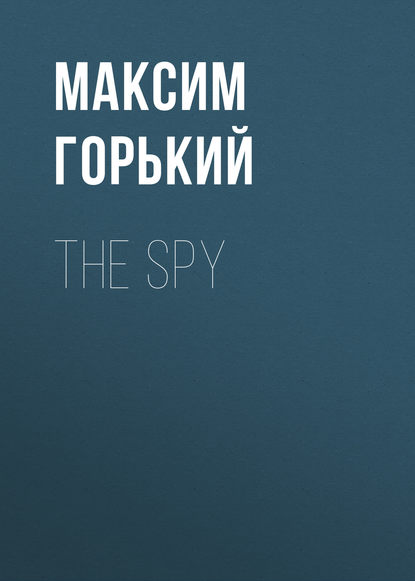По всем вопросам обращайтесь на: info@litportal.ru
(©) 2003-2024.
✖
The Spy
Настройки чтения
Размер шрифта
Высота строк
Поля
He sat at the window almost until daybreak. It seemed to him that his entire body shrivelled up and collapsed within him like a rubber ball from which the air is expelled. Within grief relentlessly sucked at his heart; without the darkness pressed upon him, full of faces lying in wait. Amid them, like a red ball, lowered the sinister face of Sasha. Klimkov crouched on his seat unable to think. Finally he rose cautiously, and quietly hid himself under the blanket of the bed.
CHAPTER XXI
Life, like a horse that has stood idle too long, began to caper strangely, refusing to surrender to the will of those who wanted to control it – who wanted to control it just as senselessly, just as cruelly as before.
Every evening the people connected with the Department of Safety, who were utterly at a loss, spoke more and more alarmingly of the increasing signs of universal excitement, of the secret league of peasants, who had resolved to take the land by force from the landowners, of the gatherings of workingmen who began to censure the administration openly, of the power of the revolutionists, which clearly was growing from day to day. Filip Filippovich, without abating, continued to scratch the agents of the Department of Safety with his sharp-edged, irritating voice. He overwhelmed everybody with reproaches for inactivity. And Yasnogursky, smacking his lips, made tragic appeals to the agents while pressing his hands to his bosom.
"My children, exert yourselves. Remember that service in behalf of the Czar is not wasted."
But when Krasavin inquired gloomily, "What are we to do?" he merely waved his hand, and stood for a long time with his deep black mouth gaping strangely, unable to find a reply.
"Catch them!" he finally shouted.
Yevsey, who listened to everything, heard the dapper Leontyev cough drily, and say to Sasha:
"Apparently our old methods of war upon the rebels are no good in these days of universal madness."
"Ye-e-e-es, you can't put out fire with spittle," hissed Sasha, a smile distorting his face.
Everybody was vexed and complained and shouted. Sasha drew up his long legs, and cried in mocking derision:
"Aha! The gentlemen revolutionists are getting the better of us, eh?"
He laughed, and his laugh irritated everybody. Yevsey felt that this man was not afraid of anything, and he endeavored not to hear his talk.
The spies tossed about the streets day and night, and every evening brought long reports of their observations. They spoke to one another mournfully:
"Is this the way to work nowadays? Dear me!"
Apparently no one knew a means by which the elemental growth of the popular revolt could be restrained.
"They will comb our curls," said Piotr, cracking his knuckles.
"They'll take us off the list if we remain alive," Solovyov chimed in dismally.
"If they would give us a pension at least! But they won't."
"A noose around our necks, not a pension," said Melnikov sombrely.
The spies were all exhausted and confused; all trembled in fear of the morrow. Both they and the officials seemed to have faded. The people who but a short time ago had been terrible in Yevsey's eyes, who had appeared to him to be the powerful and invincible masters of life, now ran from one corner of the Department of Safety to another, and fluttered about in the streets like last year's dried leaves.
He observed with amazement that there were other people, cheerful, simple, and trusting, who were able to walk into the future, carelessly stepping over every obstacle and snare in their way, everyone of whom was good in his own fashion, and everyone of whom clearly hinted at the possibility of something better than himself. Yevsey compared them with the spies, who, unwillingly with clandestine tread, crept along the streets and into houses, and secretly spirited away these people at night, in order to seclude them in prisons. He clearly realized that the spies did not understand the aim of their work, did not believe that it was needful for life, and did not think or reason when, instinctively, according to their habit, they went about half-sick, half-drunk, driven by different fears.
He liked the tranquil talk of Olga, her greyish blue eyes, and that live strong pity for people which sounded in the girl's every word. He liked the noisy, jesting, somewhat boastful talker Yakov, the careless Aleksey, good-naturedly ready to give away his last shirt and penny to anyone who asked for them. He met an increasing number of people new to him, in each of whom he perceived faith in the victory of his dream. And Yevsey involuntarily, insensibly, yielded to this faith.
Observing the quick crumbling of that power which he had hitherto submissively served, Yevsey began to seek a way by which it would be possible for him to circumvent and escape the necessity of betrayal. He reasoned thus:
"If I go to them, then it will be impossible for me not to deliver them up. To hand them over to another agent is still worse. I must tell them. Now that they are becoming more powerful, it will be better for me to be with them."
So, yielding to the attraction exerted upon him by persons new to him, he visited Yakov more frequently, and became more insistent in endeavoring to meet Olga. After each visit he reported in a quiet voice to Sasha every detail of his intercourse with them – what they said, what they read, and what they wanted to do. He enjoyed telling of them, in fact, repeated their talk with secret satisfaction.
"Oh, a funeral," snuffled Sasha, angrily and sarcastically fixing Klimkov with his dim eyes. "You must push them on yourself, if they are inattentive. You must get in a hint that you can furnish them with type, fix up a printing office. Is it possible you can't do that?"
Yevsey was silent.
"I am asking you, idiot, can you do it? Well?"
"I can."
"Why don't you speak out? Suggest it to them to-morrow, do you hear?"
"Very well."
It was easy for Klimkov to fulfil Sasha's order. In reporting about his cousin's circle, he had not ventured to tell Sasha that both Olga and Yakov had already asked him twice, whether he could obtain type for them. Each time he had managed to get away without answering.
The next evening he went to Olga, carrying in his breast the dark feeling of emptiness he always experienced in moments of nervous tension. The resolution to fulfil the task was put into him by a stranger's will; he did not have to think about it himself. This resolution spread within him, and crowded out all fear, all inconvenient sympathy.
But when the tall figure of Olga stood before him in the small dimly lighted room, and behind her he saw her large shadow on the wall, which moved to meet him, Klimkov lost courage, grew confused, and stood in the doorway without speaking.
"I've just returned from the factory," said Olga pressing his hand. "We had another meeting today. What's the matter with you? Are you tired? Are you sick? Come in, sit down. Let's have some tea, yes?"
She turned the light in the lamp higher, and looked at Klimkov with a smile. While getting the dishes ready she continued.
"I like to drink tea with you alone. I myself and all the comrades, we talk a great deal. We must talk so much, we scarcely have time to think. That's absurd, and bad, but it's true. So it's pleasant to see a taciturn, thinking man. Will you have a glass of milk? It will do you good. You are growing very thin, it seems to me."
Klimkov took the glass she offered him, and slowly sipped the watery unsavory milk. He wanted to get through with the business at once.
"This is it. You said you need type."
"I did. I know you'll give it to us."
She said these words simply, with a confidence not to be shaken. They were like a blow to Yevsey. He flung himself on the back of the chair astonished.
"Why do you know?" he asked dully after a pause.
"When I asked you, you said neither yes nor no. So I thought you would certainly say yes."
Yevsey did not understand. He tried not to meet her look.
"Why?" he queried again.
"It must be because I consider you a good man. I trust you."
"You mustn't trust," said Yevsey.
"Well, enough nonsense, you must."
"And suppose you've been mistaken?"

















